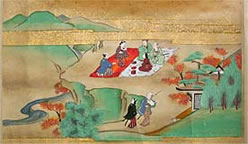■ Japanese Language Studies
| Japanese Language Studies covers the Japanese language comprehensively. There are many variations of the Japanese language, such as classical Japanese, modern Japanese, and contemporary Japanese, with specific features in each era. There are also diverse dialects in Japan. In addition to these historical and geographical variations, Japanese Language Studies also incorporates studies on sound, vocabulary, meaning, grammar, and written and spoken Japanese. In our department, students study the basics of the Japanese language in the first year, and then from the second year on, learn how to address specific themes in the Japanese language with more specialized lectures and seminars. After the first year, students may also take linguistics and contrastive linguistics classes. By looking at the Japanese language from an outside perspective and comparing it with other language, students will gain a better understanding of the nature of Japanese and the nature of language in general. In the final year, students are expected to write a graduation thesis. |
■ Teaching of Japanese as a Foreign Language
Students in the Course of the Teaching of Japanese as a Foreign Language may take specialized courses on the teaching of Japanese as a foreign language intensively and comprehensively from the second year. Courses on teaching and learning languages (methods of teaching languages, studies on teaching materials, intercultural communication, classroom research, etc.) and on the Japanese language and languages in general (Japanese grammar, history of Japanese language, contrastive linguistics, etc.) are offered. These courses not only teach the basic knowledge and capabilities necessary for teaching Japanese, but also enable the students to gain a better understanding of Japanese society, which is becoming increasingly multicultural. Enhancing students’ abilities in practical teaching and intercultural communication is one of the main focuses. Students are able, for instance, to participate in workshops on teaching Japanese in Taiwan, South Korea, and in other countries every year to experience teaching Japanese abroad firsthand and to have opportunities for international exchange. In the final year, students are required to participate in teaching practice at educational institutions. Students are also encouraged to engage in the management of Japanese language classes for foreign students on campus as an extracurricular activity. |
■ Japanese Literature
 The curriculum is designed for students to obtain basic knowledge of Japanese literature in the first year and to take more advanced courses, including reading characters written in the cursive running script style and studying specialized materials, from the second year on. Poetry, prose, and drama from all eras, from the oldest works of “Manyoshu” and “Kojiki” to contemporary literature, are covered in daily lectures, seminars, and in graduation theses, with the aim of analyzing literary works in detail, analyzing a piece of literature from a multidimensional perspective through related material while taking the author’s life and social background into consideration, and gaining an understanding of the meaning of cultural phenomena more broadly. Exercises in Japanese literature include “The Tale of Genji and historical stories,” “A study on the Tale of the Heike,” “Exercises on Oku no Hosomichi,” “Modern novels with a focus on the relationship between men and women,” “Looking at folk culture externally and internally,” and other topics. Students are encouraged to choose a theme that interests them the most and research that theme from various perspectives for their graduation thesis. The curriculum is designed for students to obtain basic knowledge of Japanese literature in the first year and to take more advanced courses, including reading characters written in the cursive running script style and studying specialized materials, from the second year on. Poetry, prose, and drama from all eras, from the oldest works of “Manyoshu” and “Kojiki” to contemporary literature, are covered in daily lectures, seminars, and in graduation theses, with the aim of analyzing literary works in detail, analyzing a piece of literature from a multidimensional perspective through related material while taking the author’s life and social background into consideration, and gaining an understanding of the meaning of cultural phenomena more broadly. Exercises in Japanese literature include “The Tale of Genji and historical stories,” “A study on the Tale of the Heike,” “Exercises on Oku no Hosomichi,” “Modern novels with a focus on the relationship between men and women,” “Looking at folk culture externally and internally,” and other topics. Students are encouraged to choose a theme that interests them the most and research that theme from various perspectives for their graduation thesis. |
